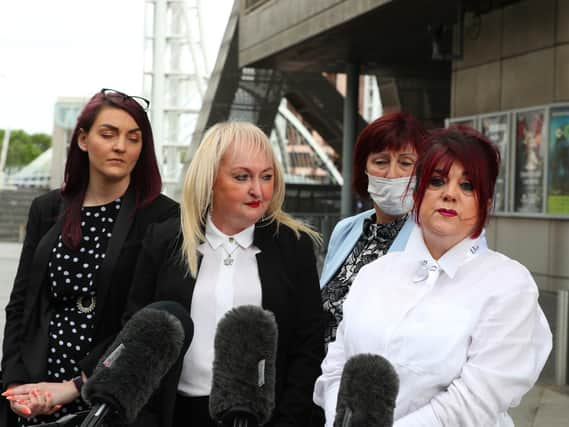Hillsborough disaster victim's daughter calls for change in law as trial collapses


The jury sitting at the Nightingale court at the Lowry Theatre in Salford heard police officers’ statements were changed to remove criticisms of the force following the 1989 disaster, in which 96 Liverpool fans died, ahead of an inquiry into safety at sports grounds led by Lord Justice Taylor.
Former chief superintendent Donald Denton, 83, Alan Foster, 74, a retired detective chief inspector, and Peter Metcalf, 71, who acted as solicitor for South Yorkshire Police, were all accused of intending to pervert the course of justice by being part of the process.
Advertisement
Hide AdAdvertisement
Hide AdBut judge Mr Justice William Davis ordered the jury to find the three men not guilty after he ruled the inquiry was not a course of public justice.
Speaking in court before the jury came in, Christine Burke, whose father Henry died in the disaster, said: “The judiciary is broken.”
She said her father had been buried “with a lie”.
She added: “The law needs to change.”
Mayor of Greater Manchester Andy Burnham, who has been a campaigner for families of the 96, wrote on Twitter: “From what I have witnessed first-hand over the last four years, I can only conclude that the scales of justice in this country are weighed heavily against ordinary people.”
He called for the introduction of a Hillsborough Law, which would include a duty of candour for police.
Advertisement
Hide AdAdvertisement
Hide AdHe said: “To have a case of this magnitude ruled out on a technicality beggars belief. This country needs the Hillsborough Law – and it needs it NOW.”
During the trial, lawyers for Metcalf argued he was entitled to act in his client’s interests.
His defence team called Sir Robert Francis QC, a barrister who has chaired a number of public inquiries, to give evidence as an expert witness.
Sir Robert described a culture of “minimal disclosure” in the 1980s and said it was the job of a lawyer to do their best for the client.
Advertisement
Hide AdAdvertisement
Hide AdIn their submission arguing Metcalf had no case to answer, his legal team, led by Jonathan Goldberg QC, said the solicitor was fully entitled to advise officers to omit matters from their recollections for the public inquiry, provided they did not become misleading.
Mr Goldberg said: “This court is not a court of morals. This court is not a court of common decency.”
Expert evidence from Gregory Treverton-Jones QC, who was called by the prosecution and said solicitors had a duty of candour, was described as “incoherent” and “irrational” by the defence.
Campaigners called for a duty of candour to be introduced in law following the inquests into the Hillsborough disaster, which found the 96 victims were unlawfully killed and errors by the police and ambulance service caused or contributed to their deaths.
Advertisement
Hide AdAdvertisement
Hide AdIn a report published by the Home Office following the hearings, Bishop James Jones also called for such a duty.
Mr Goldberg mentioned the Hillsborough Law campaign in his opening speech to the jury.
He said: “If there had genuinely been a duty of candour in existence in 1989, as the prosecution claim, what need for the numerous unsuccessful efforts to bring one in ever since?”